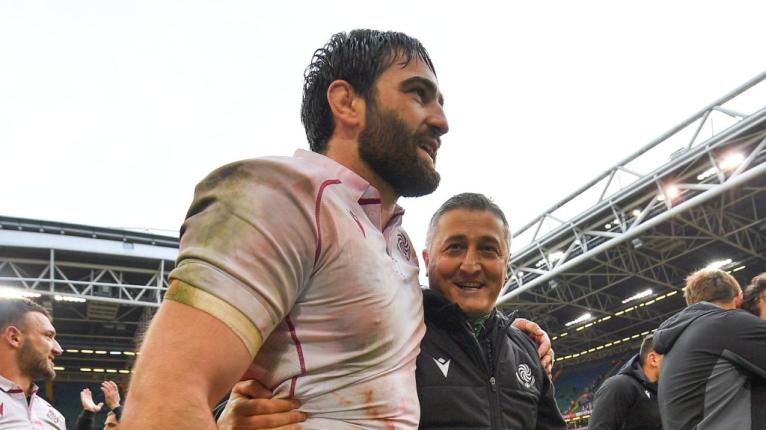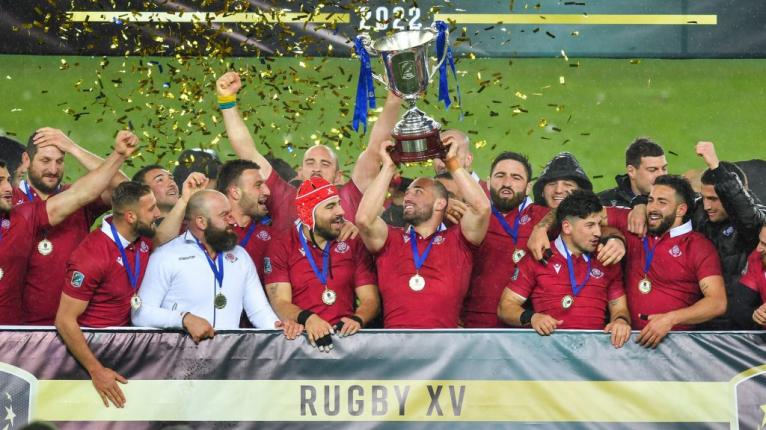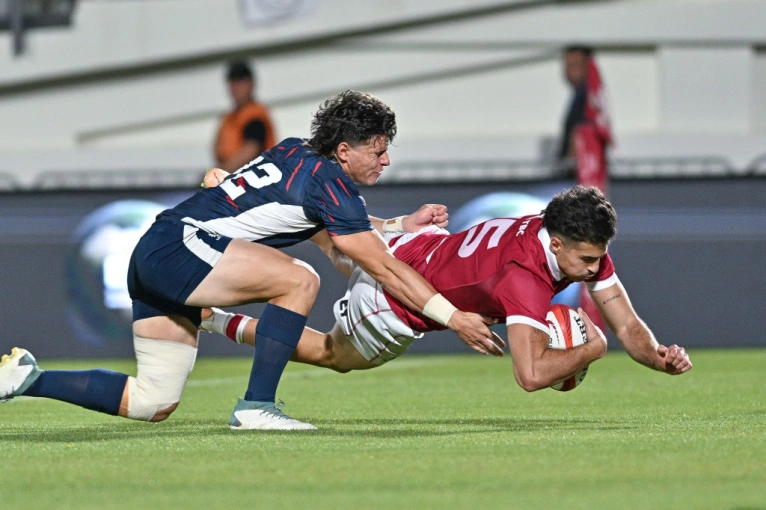Levan Maisashvili raises his eyebrows, leans forward and makes a bullish proclamation.
“I promise, I will beat one of the Tier One teams during the Rugby World Cup. It may be a very big quote from me but I want to do that. Next… Do you have any idea what will come next? I don’t.”
The Georgia coach is hungry. He smells blood in the water of the most intriguing pool of the tournament. The Lelos are pitched in with Wales and Australia, each in a state of confusion-stroke-transition, a deadly Fiji team who conquered Twickenham, and emerging Portugal, a regular opponent in the Rugby Europe Championship.
Maisashvili has already done a number on Wales, of course. Georgia sacked Cardiff in November and heaped pressure upon the doomed Wayne Pivac with their first away win over a Tier One nation. Four months earlier, they swept Italy aside in Tbilisi with a blend of power and panache. They led Scotland 6-0 at half-time on Saturday evening before the home side found their edge.
These matches are sustenance to Georgia and recently, Maisashvili has been feeling a little malnourished.
His players habitually boss the Rugby Europe Championship and after a sixth successive title in 2023, have won it 15 times from 23 attempts. They are currently on a 30-game winning streak in the competition.
Their Under-20s are have beaten Scotland twice, Argentina, England and Italy in the past year alone. The Black Lion franchise, launched in 2021, is flourishing and will participate in next year’s Challenge Cup. The Georgian game is bankrolled by the riches of Bidzina Ivanishvili, the country’s former prime minister whose wealth has been estimated at US$4.9bn by Forbes.

Georgia is in fine rugby fettle, but there are gnawing concerns it can only grow so far under the current set-up. Plaintiff cries for Six Nations inclusion seem forlorn. A mooted Nations League may not provide the opportunities they crave.
“What do we need? Consistency,” Maisashvili says. “Inside Georgia, our government is supporting us. They are supporting us as much as possible. People who have commercial interests, if we want to invite them, they also need some big competition. They want something. That’s the political side.
“If you look at the sporting side, no one can avoid our achievements. No one can. Our national team, our Black Lion team, our U20 team. We need a competition because from November until July we have a huge gap where our only competition is the Rugby Europe Championship, where we play against Tier Two countries. Otherwise, somewhere, our development will stop.
“We have a very good relationship and good discussion with World Rugby but some things are still not solved. I also understand some tournaments such as Six Nations are commercial tournaments.
“I am a coach, I need opportunities. I cannot go into that discussion. I can play against the good teams. How we get that opportunity, other people will decide. But we have to find solutions, because we also need games. Without games, our development cannot be so obvious.”
We would never have beaten Italy or Wales only with mauling and scrummaging. We are developing.
Those seriously eye-catching Tier One scalps conjure memories to endure forever. Maisashvili entrusted replacement fly-half Luka Matkava, winning his second cap, with the match-settling penalty in the dying embers in Wales. The cameras cut to the coaches’ box as the 21-year-old took aim, where Maisashvili screwed his eyes shut in silent prayer.
“I’ll remember that moment all my life. Luka is a very strong boy mentally, maybe he is not experienced, but he is very balanced, he has a very good personality – that’s why I trust him.”
Matkava is a decent parable for where Georgia are heading. A bright, burgeoning play-maker reared in the national high-performance system. The old perception of hirsute monsters playing one-dimensional, up-the-jumper fare is fading. There are still 13 Georgian props in the Top 14, but there are also wonderful backline talents. Davit Niniashvili has set the league ablaze with Lyon, and was voted rookie of the year in 2022. Tedo Abzhandadze and his premier half-back colleagues Vasil Lobzhanidze and Gela Aprasidze are canny attacking threats, all of whom play in France. Akaki Tabutsadze might have scored the bulk of his Georgian-record 29 tries in 30 Tests against modest opposition, but he scored them nevertheless.
“Our forwards were always famous and always played for big clubs,” Maisashvili says. “That picture is changing, because now we have very good backs who play in Top 14 teams. We have a very good fully professional franchise team training the whole year. We have our U20s and our U18s, with coaches, high-performance staff, working together. Our guys are young. We have great potential.
“Why wasn’t it this way before? Because the majority of our players who played in France, were props or back-rows. That is still our stereotype, and all stereotypes break when you change something.

“We have to have a varied approach. Our DNA, still, is wrestling, collisions, maul, scrum. But if you watch international rugby, you cannot use only one weapon. You have to be very smart, very quick. You have to transition quickly from one action to the next.
“We would never have beaten Italy or Wales only with mauling and scrummaging. We are developing. We don’t want to lose our ambition and strengths but we need to use our quick play and adapt to the new trends of rugby.”
Maisashvili talks a lot about what it means to be Georgian, to be embroiled in so many battles and so much conflict through the bloody years of Caucasus history. Georgia declared independence from the Soviet Union in 1991. Two years earlier, the Lelos played their first Test match. Scotland prop WP Nel, who packed down against them on Saturday, was already toddling around his sheep farm on the Northern Cape by then.
“We have never been a big country,” Maisashvili continues. “We have always been a small country and our identity was always our spirit of fighting, defending our country, our families. And we still are. We are still orthodox, we still speak Georgian, we still have our traditions. Nothing changed. Nothing. Our DNA is our DNA. It is pretty obvious and helpful for rugby because of that resilience which Georgian people have. Rugby is a lifestyle, it shows all your identity, habits, strengths and weaknesses, and you cannot hide on the field.”
I dropped 25kg in weight. I was less than 60kg. My lungs were 99% collapsed. If you see the scan of my lungs, it’s the lungs of the dead man.
The coach knows all about those rugged characteristics. Two years ago, he lay fighting for his life in a Johannesburg hospital. Covid-19 swept through the Georgian squad as they faced South Africa in a Lions tour curtain-raiser. The virus nearly killed Maisashvili. His body withering in a comatose state, doctors gave him a 2% chance of survival.
“I was almost dead. Maybe it’s better to say I was dying. But I survived. I spent approximately 28 days in a coma, and in total I spent two-and-a-half months at Milpark Hospital in Jo’burg.
“I dropped 25kg in weight. I was less than 60kg. My lungs were 99% collapsed. If you see the scan of my lungs, it’s the lungs of the dead man. I had sepsis. I had everything you can imagine. Everyone was waiting for me to die. Every night was like a last night. But some miracle happened. Maybe it was a lot of people who were praying for me.”
Maisashvili returned to Tbiilsi in late September. A fortnight later, he was on the training pitch.
“When I got to the airport, I was like a shadow walking. I said I would be standing on the field in the middle of October. Everyone was thinking, ‘he is not normal, maybe he is on drugs or something, such a shame this person doesn’t understand his situation’. I was standing on the field on 10th October.
“When I had a chat with my doctor in Jo’burg, who was amazing, I told him I needed to go home as quickly as possible because my recovery will go much better there. It was absolutely true because my job is all my life, I am a coach for 31 years. As soon as I started to watch training, was just involved in that process slowly, my recovery was much better.
“It was not until summer 2022 I felt fully healthy. Until then I had huge trouble. But I didn’t identify that at the time because I was fighting day by day, step by step.
“After that our relationship between players and staff just became tighter and tougher. Everyone now understands: nothing is unachievable. The staff are not only colleagues, they are my good friends. The majority of players grew with me from childhood. It was a good experience for me and everyone who has to fight: never give up, never give up.”

Maybe it’s easy to understand why Maisashvili is filled with such belief about the prowess of his team and the potential it has. But what about those bold World Cup statements? Surely slaying another Tier One victim would make their case for more top-class rugby too compelling to resist?
“It’s very important for us of course but look at the past,” Maisashvili replies. “Before Italy, everyone was saying, ‘you have to beat Italy, and if you beat them it will send a clear message for the Six Nations’. Okay. We beat them. Autumn, how can we improve our game? We beat the Welsh. Everyone was talking about what we can do.
“We beat two Tier One countries. Who will be next? I don’t know. But someone will be next. Someone will be third, and then fourth. Maybe after that I will ask you the question, if it helped or not.
“We will find other ways to play and develop. We will never stop fighting.”


Good luck Levan. I am going to RWC hoping to celebrate two victories in the end of September.
Thanks for this. Really interesting. I’d love to hear more about this team throughout the year.
Nice piece thanks Jamie. 👍